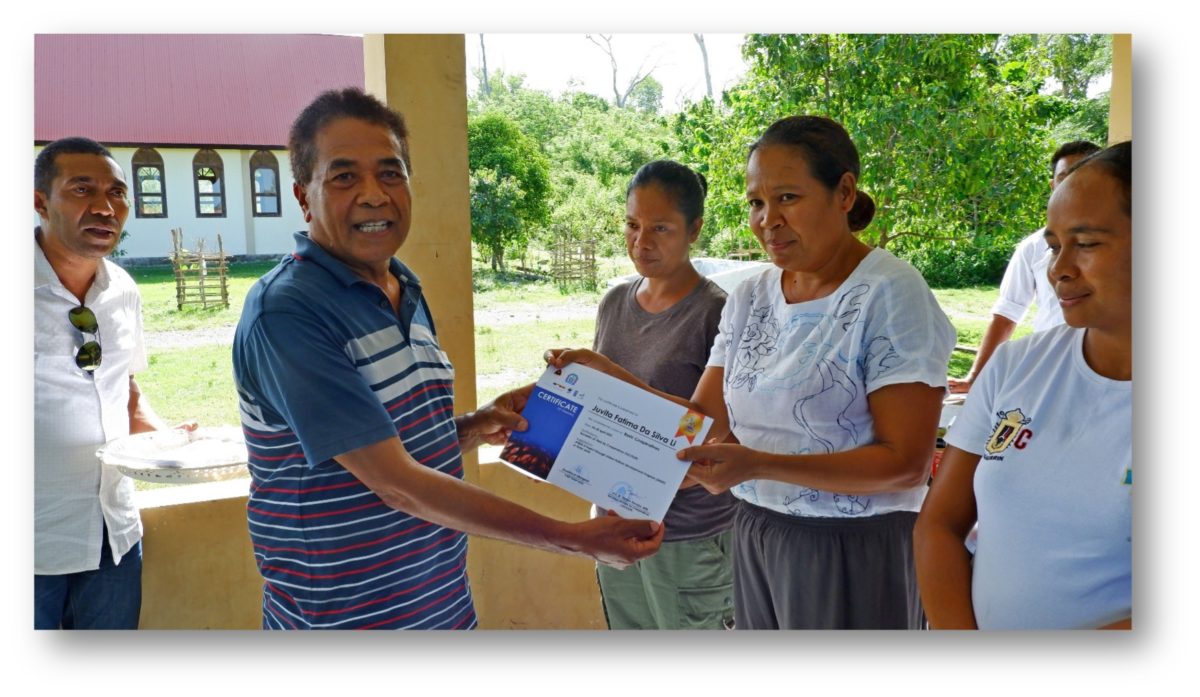In the Manatuto Municipality of Timor-Leste, rural poverty poses a major problem. But the key to solving these issues could be found in the promotion of sustainable fishery practices, with a focus on empowering women’s entrepreneurship in rural areas through a series of cooperatives. The ATSEA-2 Project is working in the Barique Posto Administrativo in Manatuto Municipality to build a stepping stone in the journey to this destination, thereby helping women in the region to play a pioneering role in development.
Although women are actively involved in the process of fish production, processing and marketing in Timor-Leste, they often lack official legal status, which prevents them gaining access to credit, education and technology. Cooperative institutions are therefore needed to accelerate the process of development and the participation of women in their organisational and business activities.
In many countries, cooperatives have proven to be a workable framework through which fishing communities can organise and optimise limited resources to increase their income. Fishers across Manatuto Municipality have identified unsold catches as an issue in need of attention; the lack of consumers, combined with a lack of access to markets, is a common challenge for many who live and work here. Most of the small-scale fishers are struggling with low technical capacity in relation to processing and marketing, which has led to poor quality and low prices, ultimately driving down demand from buyers.
Working in collaboration with the Ministry of Agriculture and Fisheries (MAF) and Ministry of Cooperatives of Timor-Leste, the ATSEA-2 Project has initiated a series of training sessions geared toward establishing women’s cooperatives in several villages in Barique Posto Administrativo.

Conducted from 25-29 April 2022 and involving 43 women participants, this training was aimed at improving the managerial, organisational and technical capabilities of women fishers, while also getting the ball rolling in terms of the legal aspects required for establishing female-led cooperatives.
“We really hope to institutionalise a cooperative that is led and established by women,” explains Maria da Gloria Mendes, one of many attendees who expressed their gratitude for the opportunity to participate in the training. “However, we are always constrained in capital and knowledge related to the formation and management of cooperatives,” she added. With the support of UNDP Timor-Leste and the ATSEA-2 Project, working in collaboration with the Ministry of Cooperatives, Maria’s hopes are finally coming to fruition.
“This five-day training is very useful for managing our business well,” she said. “With the formation of this cooperative, we will focus even more on developing our business – the results we get will be saved in the cooperative as capital for business development,” she continued. Like many women at the event, Maria hopes that the training and the cooperatives it creates will help support local people’s livelihoods and ultimately increase their earning power.
By harnessing their potential, engaging and empowering women can drive major improvements in local economies and improve the value chain. The new cooperatives can contribute to building women’s confidence, generating acknowledgement and support from male community members and delivering improved employment opportunities for women in the community.
“This training is very important for women to be more meticulous and resilient in managing various business activities, managing and selling fish catches,” says Florindo da Costa Magalhães, the Head of Barique Posto Administrativo. “I hope that the Ministry of Cooperatives will continue to assist in finding solutions to the challenges that may be faced,” they added.
Since its inception in 2019, the ATSEA-2 Project has been working to improve the quality of life of people in the Arafura Timor Seas (ATS) region through a combination of restoration, conservation and sustainable management of marine-coastal ecosystems. ATSEA-2 is committed to safeguarding the livelihoods and prosperity of coastal people, particularly in its transboundary areas, through the implementation of sustainable integrated concepts.
This article was published on the GEF IW:Learn website.
(By Bernardo De Jesus Pereira Belo)


